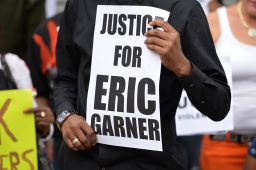Story highlights
Federal prosecutors disagree over whether to bring charges in the Eric Garner case
Objections from the U.S. Attorney in Brooklyn shelved a Justice Department plan to bring civil rights charges
Federal prosecutors and investigators are in disagreement over the strength of evidence in the investigation of the 2014 death of Eric Garner, stalling efforts so far to bring charges in the case, law enforcement officials briefed on the case tell CNN.
As recently as three months ago, the Justice Department Civil Rights Division in Washington appeared close to announcing charges, law enforcement officials briefed on the probe said.

But objections from several officials overseeing the case, including from the U.S. Attorney’s Office in Brooklyn and the FBI, have at least temporarily shelved those plans.
A Justice Department spokeswoman said the investigation is still ongoing and no decisions have been made.
Federal prosecutors in recent months have been using a grand jury in Brooklyn as part of their probe, CNN has previously reported. The focus of the investigation has been on whether NYPD officer Daniel Pantaleo used excessive force and broke the law in trying to arrest Garner for selling untaxed cigarettes.
Pantaleo was shown on video, recorded by a bystander, using what witnesses said appeared to be a chokehold technique during the Garner takedown. The NYPD bans the use of chokeholds. Garner could be heard saying “I can’t breathe” in the video, a phrase that became rallying cry for street protesters in the wake of a spate of police-involved deaths.
Pantaleo’s attorney, Stuart London, said: “I’ve never thought any federally protected constitutional right was ever violated. This was a simple street encounter with no specific intent to ever violate his civil rights. It is very frustrating for my client to have this cloud still remain.”
The Justice Department investigation in Garner case has faced numerous hurdles. New York state law provides immunity to anyone who testifies to a grand jury, which meant that the FBI agents and prosecutors working the case had to take extra steps to gather evidence for their probe.
And another complication is a dispute of whether Pantaleo used a chokehold, and if so for how long and whether it was enough force to kill Garner. Some officials involved in the case believe the evidence evidence is not conclusive.
Cases like this are notoriously hard ones to make and relatively few result in federal civil rights charges against a police officer, law enforcement officials said.
Some officials led by Brooklyn U.S. Attorney Robert Capers and FBI agents investigating the case have advised superiors that there isn’t enough evidence to bring charges, the law enforcement officials said.
In a statement to CNN, Justice Department spokesperson Dena Iverson said, “The Garner investigation is being handled in a manner similar to many of our civil rights investigations, where experienced prosecutors from both the U.S. Attorney’s office and the Civil Rights Division jointly investigate the case. In every single case the department brings – including civil rights matters – the department reaches one decision regarding whether charges can responsibly be brought at the conclusion of the investigation. The investigation into the death of Eric Garner is active and ongoing and no decisions have been made regarding the outcome of the case.”
A spokeswoman for the FBI declined comment. A spokeswoman for the Brooklyn U.S. Attorney didn’t comment.
One official involved in the matter said disputes over the strength of a case are a normal part of discussions before deciding whether to bring charges. “That’s how we test the strength of our cases,” the official said.
Last year, a New York state grand jury declined to charge Pantaleo in a separate case investigated by the Staten Island district attorney.
In cases of alleged police misconduct, state laws offer more broad authority to bring charges. Federal charges are considered a fall back because federal law has much narrower jurisdiction.




